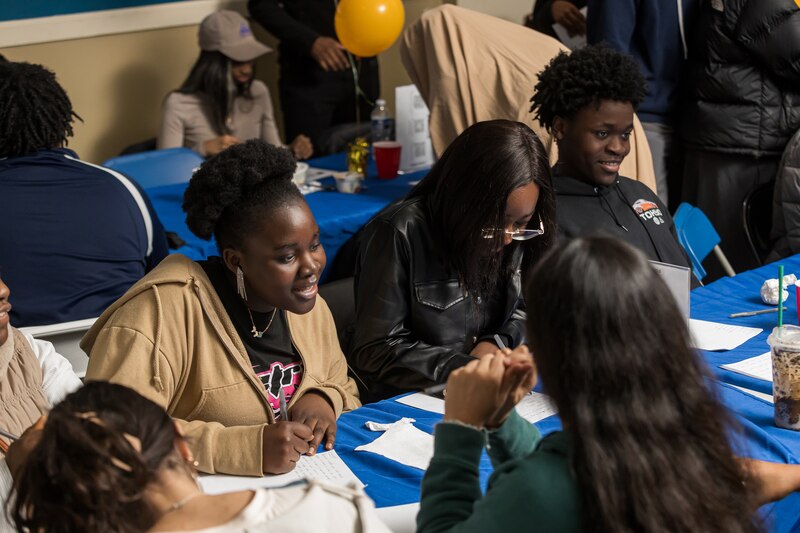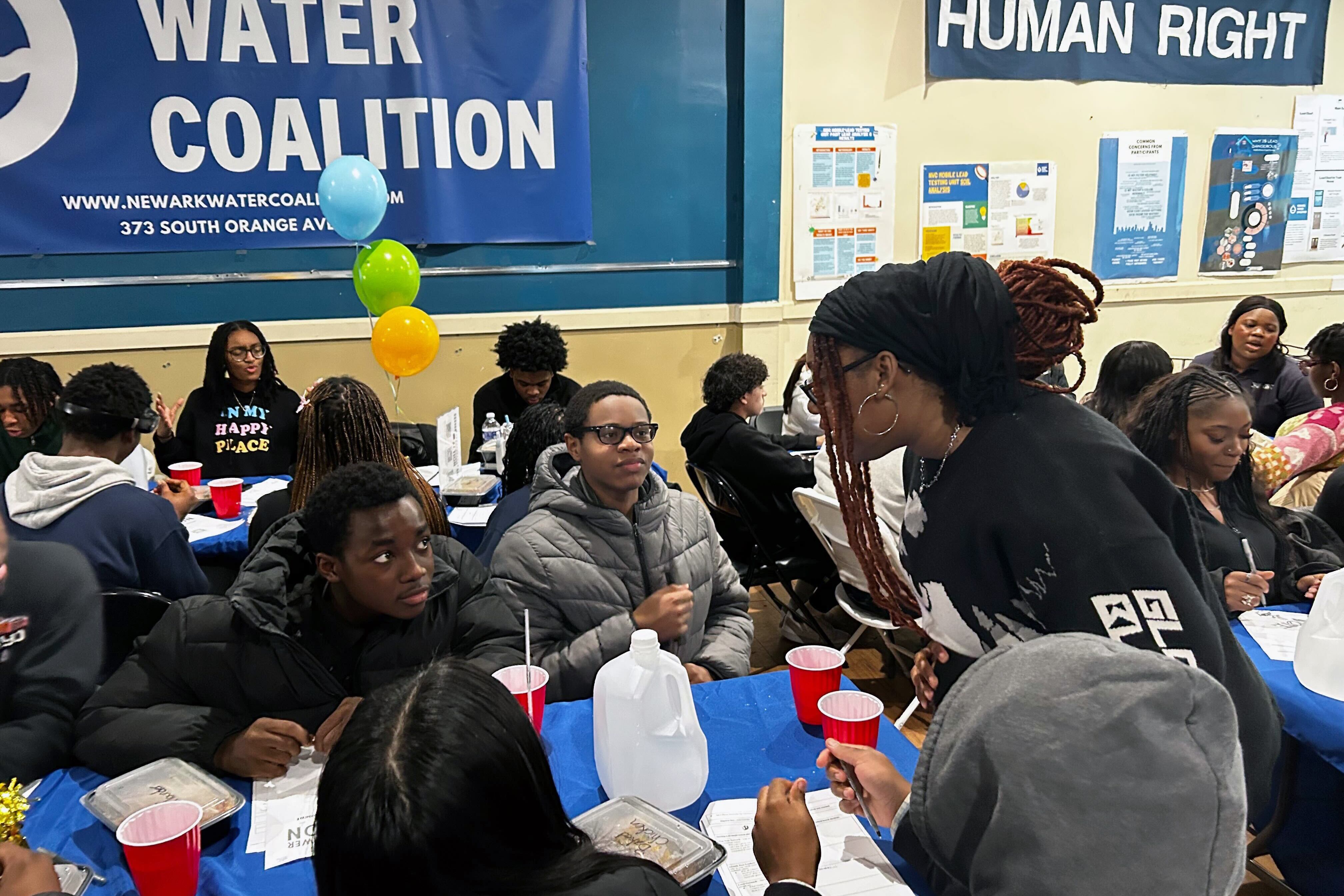Sign up for Chalkbeat Newark’s free newsletter to get the latest news about the city’s public school system delivered to your inbox.
The first Wednesday in March was a day off for the city’s public school students, but rather than staying home, some gathered at the Newark Water Coalition office on South Orange Street to learn more about their new right to vote.
Ayasiah Fraser, a youth facilitator with the nonprofit The Gem Project, stood on a platform at the front of a packed room as she talked about the power of the youth vote and how to talk to friends about the Newark school board election on April 15, where the city’s 16- and 17-year-olds will participate for the first time.
“What places or events can you meet your peers to talk to them about the school board election?” Fraser asked the crowd of more than 60 city youth.
“Public libraries,” said one student.
“Parks or school clubs,” said another.
“Concerts, hair salons!” shouted a third, then a fourth.
The group at the Newark Water Coalition was participating in The Gem Project’s Youth Power Action Day, a four-hour training session led by city youth and meant to help young voters understand their rights, advocate for their communities, and develop their interest in civic engagement.
The training also fielded questions about the functions of a city school board and how board members operate, and empowered students to ask questions about creating change in schools.
Krystian Wilson, a University High School senior who attended the training, said he was there to get registered to vote but also to learn more about the city school board’s role and impact on his education.
“I think it’s important to defend ourselves and voice our own opinions, especially for what we want in our own communities,” Wilson, 17, said.
Newark became the first city in New Jersey last year to lower the voting age to 16 for school board elections. That decision has sparked a mix of enthusiasm among young voters and challenges for city leaders tasked with registering new voters by March 25 and educating them enough to make informed choices on election day.
Over 7,000 16- and 17-year-olds are eligible to cast a ballot in next month’s election, when voters will choose from 11 candidates vying for a seat on the Newark Board of Education.
Students like Lanajah Womack, a senior at West Side High School, also attended The Gem Project’s training because she wanted to learn about the issues affecting her peers. She said that for years, many of her friends have complained about school lunches, while others feel like having a younger voice on the school board could help connect the real world to what they are learning.
“I say, like, just switch the whole [school] curriculum because most of the curriculum that we have feels old, and like, we don’t really relate to it, we don’t connect,” said Womack, 17, who is also the valedictorian of her class.
Rayvin Stubbs, a senior at University High School who was also at the youth training event, said she hopes her vote can be a step toward diversifying schools and the curriculum because she wants to have “an understanding of everybody’s culture and cultural backgrounds” before getting to college.
“We only know our perspective as Black people, but we don’t know the perspective of people who are Afro-Latino or people who are like Indian-American,” Stubbs, 17, added.
The expanded voting rights for Newark youth could boost voter turnout for the school board election, which historically has seen around 3% to 4% of registered voters participating. Young voters can also impact this year’s election by choosing three candidates who are not part of the city-backed “Moving Newark Schools Forward” slate, which has won every school board election since 2016.
Newark’s new young voters will have to seek out information
But getting new voters ready to vote in any election comes with its own set of challenges, said Micah Rasmussen, director of the Rebovich Institute for New Jersey Politics at Rider University. Young voters will quickly realize that it’s up to them to seek out information about school issues, the candidates, and their platforms, Rasmussen said.
“Information is not always top down, and it doesn’t always come in your direction. I’ve noticed this is especially true for local offices, at a time when less media are covering local politics, local government, and local school boards,” Rasmussen added.
Under state law, school districts are required to provide eligible voters with registration forms, a summary of voter registration eligibility requirements, materials describing the role of a citizen, and information that highlights the importance of voting, but they are not required to provide information about local elections.
Last month, Newark Public Schools Superintendent Roger León said the district launched a voter registration campaign similar to the one it hosted before the general election. Léon is also visiting high schools and discussing the importance of participating in the school board election.

But Yanibel Feliz, a math teacher and Student Government Association advisor at KIPP Newark Collegiate Academy, said it was hard to find information on this year’s school board race when she was planning her lessons. Feliz had to dig through LinkedIn profiles, Facebook pages, and media articles to find out about this year’s candidates.
“It was time-consuming,” Feliz said, who’s been helping her SGA students understand the functions of the city’s Board of Education and its relationship to charter schools.
“We’ve been having these big conversations about what really is the school board and unpacking that with students,” Feliz said. “I think educating our students about the election is more than just a one-day conversation. The more people talk about it, the more people know.”
Feliz said her students had greater access to information about the November presidential election because of social media platforms such as TikTok and Instagram.
Over several lessons, she has explained to her students that the city’s charter schools are publicly funded by Newark Public Schools and that some lease building space from the district.
Feliz also unpacked the school board’s impact on students, teachers, and the community and how it shapes education across the city. She hopes to dig into the candidates and their platforms in the coming weeks.
“This was something that they didn’t have to consider, and now they’re starting to think and learn about it,” Feliz added.
With roughly a month until the Newark school board election, students like Quyan Silence Palmer, a senior at Great Oaks Legacy High School who also attended The Gem Project’s youth training, say they’re voting for positive change in their schools and community.
“With the way that the world is today and who our president is, and all the things that have happened over the past few weeks, everything can change rapidly,” Palmer, 17, said. “So, we really need to instill this sense of responsibility over our communities.”
Jessie Gomez is a reporter for Chalkbeat Newark, covering public education in the city. Contact Jessie at jgomez@chalkbeat.org.





